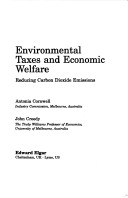New Horizons in Environmental Economics
1 total work
The authors consider a tax on domestic fuel and power and a carbon tax, and the likely adverse distribution effects of these on a population. The analysis allows for the direct and indirect effects (through inter-industry transactions) of taxes on prices and consumers' responses to these price changes. The welfare effects are also estimated for a variety of income groups. The authors then evaluate the inequality and social welfare measures and consider whether the distributional effects can be overcome by adjusting transfer payments to compensate lower-income groups. This study examines environmental taxes in Australia with methods which can be applied to other countries, some of which were specifically designed to overcome data limitation problems.
Environmental Taxes and Economic Welfare will be of special interest to researchers, academics, policymakers and advisers on taxation and environmental policy.
